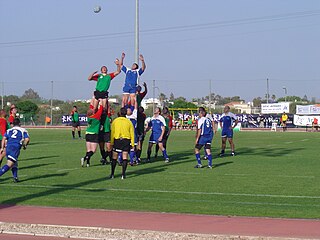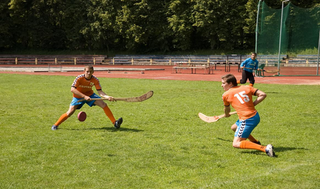
The Lithuania national rugby sevens team is a minor national sevens side. [1] They won the Bowl in the 2005 FIRA European Sevens in Moscow.

The Lithuania national rugby sevens team is a minor national sevens side. [1] They won the Bowl in the 2005 FIRA European Sevens in Moscow.
| Olympic Games record | |||||||||
|---|---|---|---|---|---|---|---|---|---|
| Year | Round | Position | Pld | W | L | D | |||
| | Did not qualify | ||||||||
| | To be determinated | ||||||||
| Total | 0 Titles | 0/2 | - | - | - | - | |||
| World Cup record | |||||||||
|---|---|---|---|---|---|---|---|---|---|
| Year | Round | Position | Pld | W | L | D | |||
| | Did not qualify | ||||||||
| | |||||||||
| | |||||||||
| | |||||||||
| | |||||||||
| | |||||||||
| | |||||||||
| Total | 0 Titles | 2/7 | 10 | 2 | 8 | 0 | |||
| Sevens Grand Prix Series record | |||||||
|---|---|---|---|---|---|---|---|
| Year | Position | Pld | W | L | D | ||
| 2011 | Did not qualify | ||||||
| 2012 | 15th | ||||||
| 2013 | Did not qualify | ||||||
| 2014 | |||||||
| 2015 | 9th | ||||||
| 2016 | 10th | ||||||
| 2017 | Did not qualify | ||||||
| 2018 | |||||||
| Total | 3/8 | ||||||

The Liberal Union of Lithuania was a liberal political party in Lithuania.

The Lithuania national football team represents Lithuania in men's international football, and is controlled by the Lithuanian Football Federation, the governing body for football in Lithuania. They played their first match in 1923. In 1940, Lithuania was occupied by the Soviet Union; the country regained its independence in 1990 and played their first match thereafter against Georgia on 27 May of that year.

The Lithuanian Football Federation is the governing body of football in Lithuania. The Federation is responsible for football development in the country and for the national teams, including the Lithuania national football team. It is based in Vilnius. LFF became a member of FIFA in 1923, but following Lithuania's annexation by the Soviet Union it was disbanded. It became a member again in 1992 after Lithuania regained its independence. The top division is A Lyga.
Lithuanian Sign Language is the national sign language used in Lithuania, with several regional variants. Very little is known about its history before 1945. From 1945 to 1990 it was used along with Russian Sign Language and the two sign languages became very similar. Russian lip-patterns used with some LGK signs indicate that the sign may have been originally borrowed from Russian Sign Language. When Lithuania became independent, its contacts with Russian Sign Language were almost cut off, and now it's developing as an independent language, with some influence from international signs.

Lazdijai, is a small city in Lithuania located about seven kilometres east of the border with Poland.

The Lithuania national rugby union team represents Lithuania in men's international rugby union competitions. Nicknamed The Knights (Vytis), is considered one of the relatively stronger tier 3 teams in European rugby and currently compete in the second division of the Rugby Europe International Championships in the Rugby Europe Trophy, a competition which is just below the Rugby Europe Championship where the top 6 countries in Europe compete. They are yet to participate in any Rugby World Cup and play in black with a pattern involving the colours red, yellow and green.

Modestas Paulauskas is a former Lithuanian professional basketball coach and basketball player.

Kovno Governorate was an administrative-territorial unit (guberniya) of the Russian Empire, with its capital in Kovno (Kaunas). It was formed on 18 December 1842 by Tsar Nicholas I from the western part of Vilna Governorate, and the order was carried out on 1 July 1843. It was part of the Vilna Governorate-General and Northwestern Krai. The governorate included almost the entire Lithuanian region of Samogitia and the northern part of Aukštaitija.
The Lithuanian Rugby Federation, abbreviated to LRF is the governing body for the sport of rugby union in Lithuania. Lithuania currently comprises 1,650 registered players and there are 15 club in the whole country.
The Lithuanian National Prize for Culture and Arts, established in 1989, is an award granted for achievements in culture and the arts. It has been awarded annually in six categories since 2006. The prize is formally bestowed on February 16, when the decorations and diplomas are presented to the laureates at Presidential Palace, commemorating the anniversary of the 1918 Act of Independence of Lithuania.

Kosovo–Lithuania relations involve foreign relations between the Republic of Kosovo and the Republic of Lithuania. Kosovo declared its independence from Serbia on 17 February 2008 and Lithuania recognized it on 6 May 2008. Diplomatic relations commenced on 16 July 2008.

Rugby union in Lithuania is a moderately popular sport.
Remigijus Pocius is a retired Lithuanian football forward, who last played for KFK Siauliai. He obtained a total number of seven caps for the Lithuania national football team, scoring one goal.

Česukai is a village in Varėna district municipality, in Alytus County, southeastern Lithuania. According to the 2001 census, the village has a population of 5 people. The village is located 1 km south to Merkinė, between Nemunas and Merkys rivers, at Dzūkija National Park. Česukai is surrounded by a pine forest and it is only reachable by a forest road which branches from Vilnius-Hrodno highway.
The Lithuania national under-17 football team or Lithuania U-17 represents Lithuania in association football at the under-17 youth level, and is controlled by the Lithuanian Football Federation.
Lithuanian Canadians are Canadians who are of full or partial Lithuanian descent. Over two-thirds of Lithuanian Canadians reside in Toronto, with other much smaller populations scattered around most of the Canadian provinces and territories.
Lithuania participated in the Eurovision Song Contest 2013 with the song "Something" written and performed by Andrius Pojavis. The Lithuanian broadcaster Lithuanian National Radio and Television (LRT) organised the national final "Eurovizijos" dainų konkurso nacionalinė atranka in order to select the Lithuanian entry for the 2013 contest in Malmö, Sweden. The national final took place over ten weeks and involved 39 competing entries. In the final, seven entries remained and the winner was selected over two rounds of voting. In the first round, the combination of votes from a jury panel and a public vote selected the top three to qualify to the superfinal. In the superfinal, a jury vote entirely selected "Something" performed by Andrius Pojavis as the winner.

Ritinis is a team sport originating in Lithuania. It is included in the World Lithuanian Games. Ritinis was also represented in the TAFISA World Games.
The Lithuania women's national under-17 football team is the national under-17 football team of Lithuania and is governed by the Lithuanian Football Federation.
Lithuania participated in the Eurovision Song Contest 2004 with the song "What's Happened to Your Love?" written by Michalis Antoniou, Linas Adomaitis and Camden-MS. The song was performed by Linas and Simona. The Lithuanian broadcaster Lithuanian National Radio and Television (LRT) returned to the Eurovision Song Contest after a one-year absence following their relegation from 2003 as one of the bottom five countries in the 2002 contest. LRT organised the national final "Eurovizijos" dainų konkurso nacionalinė atranka in order to select the Lithuanian entry for the 2004 contest in Istanbul, Turkey. The national final took place over seven weeks and involved 52 competing entries. In the final, eighteen entries remained and "What's Happened to Your Love?" performed by Linas and Simona was selected as the winner by the combination of votes from a jury panel and a public vote.